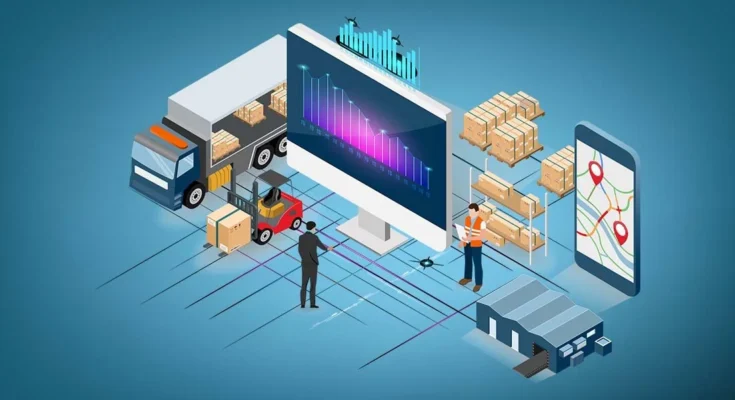In the latest fast-paced shipping landscape, accuracy and speed are paramount. They are reshaping the technology trends in logistics industry while tackling enormous challenges. And enterprises are quickly adapting to modern state-of-the-art tech developments.
Indeed, all these advancements are potentially locating logistics generation that offers excellent services. After all, the tempo of trade continues to get faster with time. So, keep reading to know what these trends are!
What does logistics technology entail?
Logistics technology can also be called log tech. It includes utilizing prevalent machinery, vehicles, and computing software. At the same time, managing the flow of goods with planned operations to reach production networks from manufacturers and consumers. This technology supports innovation upgrades, execution, precision, and run-of-the-mill execution of errands.
The key components of logistics management –
There are a few key parts in forming a consistent production network. These components are the critical components of logistics software development services that form this tech-driven arena:
- Transportation Management System
TMS improves the movement of items using course-making arrangements, along with administration decisions and transportation productivity. It provides command over shipments, decreasing expenses and guaranteeing all-around planned conveyances.
- Warehouse Management System
WMS manages the carport and recovery of stock inside distribution centers. It designs approaches by observing stock reaches to arranged destinations for precision. At the same time, it diminishes blunders in the overall execution of stockroom tasks.
- Stock Administration Programming
This one gives a genuine following of stock degrees. It helps in calling to determine the limiting stockouts or overload conditions. By optimizing stock degrees, industries can decorate order fulfillment and reduce sporting fees.
- Tracking and Visibility Tools
The logistics industry takes advantage of actual-time visibility with the movement of goods. For this, they employ RFID and GPS technologies. It enhances transparency and permits better monitoring of shipments. Thus, it minimizes the risks of delays or losses.
Technology trends in logistics industry convey agility and performance to the supply
chain. It makes sure companies live ahead in the evolving view of world trade. Now, let’s understand the evolution of technology trends in the logistics industry.
How has logistics technology evolved over the years?
The logistics automation trends over time have been marked by a transformative adventure. Their needs and business desires pushed technological development. Now, let’s explore key milestones in logistics tech:
- Automation and Computerization
In the late 20th century, the arrival of computer systems added a significant shift. It is the automation of duties like facts access and record maintenance. They have increased accuracy & reduced guide errors. Thus leading to more growth in logistics solutions.
- Introduction of TMS and WMS
The late 20th and early 21st centuries saw the emergence of TMS and WMS. These technologies changed the way transportation routes were optimized. As a result, enhanced efficiency and warehouse tactics with better visibility in the stock.
- Integration of RFID and IoT
The integration of the RFID and the IoT in the 2000s revolutionized logistics visibility. RFID tags and sensors enabled actual-time monitoring of shipments. Meanwhile, IoT gadgets provide a wealth of records for selection-making and storage.
- Rise of Cloud-Based Solutions
Next, in relation to technology trends in logistics industry, Cloud computing integration in 2010 introduced scalability and accessibility to logistics generation. These cloud-based solutions increased collaboration and record sharing. Further, it extracts real-time updates throughout the supply chain.
- Advanced Analytics and Artificial Intelligence
Recent years have been directed towards advanced analytics and AI. These technologies permit predictive analytics, forecasting, and dynamic optimization. In contrast, AI-pushed insights empower corporations to make data-based choices for better efficiency.
- E-Commerce and Last-Mile Solutions
The surge in e-commerce demanded technology trends in logistics industry to handle situations of last-mile delivery. Innovations like delivery drones and smart lockers are being explored because they beautify the speed and performance of the supply system.
This continuous evolution reflects a commitment to improving efficiency. In comparison, decreasing expenses and assembling the growing demands. Now, let’s explore the top technology trends in the logistics industry.
List of top technology trends in logistics industry
New technology in logistics industry has many transformative traits. These are now refining the way businesses operate and control supply chains. Let’s explore some of the key tendencies riding innovation and performance:
- Blockchain
Blockchain, being one of the best technology trends in logistics industry, employs decentralized, secure, and transparent ledgers for supply chain activities. From manufacturing to delivery, blockchain complements trust, reduces fraud, and improves basic transparency. Its marketplace is forecasted to have a CAGR of 45.55% from 2022 to 2030, signaling big growth in the later decade.
- Internet of Things (IoT)
IoT in the logistics enterprise connects physical devices, automobiles, and sensors. It allows real-time statistics trade, optimizes operations, and decreases delays. From tracking stock degrees to monitoring shipments, it ensures efficiency and agility in managing products and resources.
- Autonomous Vehicles
Next on our list of technology trends in logistics industry is autonomous vehicles. They are introducing self-driving generation to transportation, promoting last-mile delivery. Its motors are prepared with advanced sensors and AI algorithms to navigate routes. Therefore, it guarantees multiplied efficiency, lower operational fees, and better safety.
- Digital Twins
Digital Twins is an emerging logistics software development service. They create virtual replicas of assets and enable actual-time monitoring. Therefore, organizations can visualize and manage their supply chain factors, including warehouses, cars, and devices. They foster an agile supply chain by improving overall decision-making by 25%.
- Drones
Drones are famous among all technology trends in logistics industry. These unmanned aerial cars deliver items smartly while cutting transit instances and expenses. It is equipped with GPS sensors and provides actual-time tracking. Hence, it unlocks new levels of performance inside the dynamic world of logistics supply chains.
- Cloud Computing
Cloud-based solutions enable supply corporations to streamline operations by sharing real-time statistics. Further, it promotes seamless conversation throughout the supply chain. This accessibility uses cloud computing to satisfy the evolving demands. Hence, it is an essential trend that increases productivity and innovation inside the industry.
Adapting supply chain management technology trends isn’t a choice but a need as it makes you future-equipped and efficient. Now, let’s take a glance at logistics development services.
Can logistics development services be classified in any way?
Yes, absolutely! Logistics software development services embody the customization of software program solutions for logistics, including designing, building, and enforcing software packages. The logistics software development streamlines and optimizes diverse factors of logistics industries. Let’s see some of its development services:
- Tracking and Visibility Solutions
Being one of the best visibility technology trends in logistics industry, these solutions include building components utilizing functionalities such as GPS, RFID, and IoT for cargo tracking. Additionally, it offers real-time exposure to the production. Not only this, but these services also allow regular alerts and notifications for delays within the supply chain.
- Route Optimization Software
This type of optimization service in the logistics sector plays a role in the look and development of applications for dynamic courses. Aside from these, these solutions deliver well-timed deliveries to companies considering factors such as website visitors, fuel prices, climate, and much more.
- Last-Mile Delivery Solutions
Below, in the 3rd stage, are the last-mile delivery solutions. Thus, these services improve performance within the final leg of transport. It supports the integration of technologies such as shipping worker bees along with self-sufficient motors. Additionally, it improves client satisfaction through real-time delivery updates.
- Data Analytics Platforms
These platforms implement innovative technology trends in logistics industry for data-based selection. Additionally, in relation to technology trends in the logistics industry, they normally use predictive analytics techniques for call forecasting trend analysis, along with insights into logistics operations.
- Integration with E-Commerce Platforms
The final one on our list is exactly where the integration feature has all of the rear of API development with e-trade systems. These solutions assist in automating processes such as order processing. Besides, it helps companies with real-time inventory updates & and order repute monitoring on the opposite hand.
All in all, technology trends in logistics industry employ varied tailor-made solutions. It beautifies operational efficiency and presence, along with whole supply chain management.
Conclusion
Automation and AI are redefining the effectiveness of the supply chain. They shape the most recent technology trends in logistics industry. Businesses embracing these innovations position themselves for sustained achievement since it fosters agility by assembling the requirements associated with a dynamic industry. So, people must note it guarantees a future where logistics adapts and flourishes in evolution.




